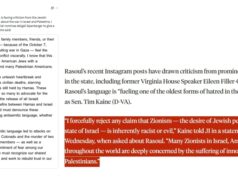by Atif Qarni, Virginia Secretary of Education
The New Zealand attacks were the most extreme form of Islamophobia. The term Islamophobia has recently been socialized. However, Islamophobia has existed since the inception of Islam. In current times, persecution and discrimination of Muslims can be seen throughout the globe ranging from Australia to Russia to China to India to Israel to Europe to the United States. Islamophobia even exists in our Commonwealth. Mosques have been vandalized, children at school have been called terrorists, and young women wearing hijabs have been spat at and their hijabs yanked off.
Virginians who are Muslim express various frustrations at not having fair representation in leadership positions.
Many Muslims in Virginia are health care practitioners, engineers, business owners, and educators. They don’t feel they have fair representation in leadership positions where significant decisions are made.
Also, many Muslims are generous in making political contributions. However, when someone from their community wants to run, convincing the establishment to support those individuals is a challenge.
I realize there are parallels we can draw between Muslims and other marginalized communities. We are gradually witnessing change in Virginia. A record number of Muslims are running for office this year at the local and state levels. As the only Muslim in the Virginia’s cabinet, appointed by Governor Northam (when few others would give me a chance), I do not take my responsibilities lightly.
We have a long way to go to address systemic racism, Islamophobia, and other forms of biases and hate that exist here at home. The root cause of this is power inequality. People in power have the ability to shape policies that impact certain communities of color or marginalized groups from seeking power. This may include access to leadership positions, wealth, quality education, health care, the ballot box, etc. This is not a unique problem in the United States, as we see similar struggles for power in other nation states as well.
For 8 years, our country had a black President—arguably in the most powerful position in the world. The image of a black man representing the face of America was a threat to the very power structure that kept people who looked like him from reaching such a height.
Today, black and brown people are mobilizing and reclaiming the power that was stolen from them or systematically denied to them. Every group deserves to have a voice and fair representation in society—that’s what Democratic societies believe but what we practice doesn’t reflect this belief. This idea of shared power is most radical ONLY because it threatens the status quo. During transitions of power, someone is always losing while the other is gaining. There will always be individuals or groups opposed to that level of inclusion, but we must continue to struggle until the status quo is a fair representation of our society.














![Monday News: Trump’s Lunacy Pushes China, Russia, India, etc. Together; “Happy Labor Day. Donald Trump and Elon Musk Are Screwing Workers.”; “Where is the [media’s] intense focus on Trump’s failing health?”; ““Trump says he is not a dictator. Isn’t he?”](https://bluevirginia.us/wp-content/uploads/2025/09/montage0901-100x75.jpg)